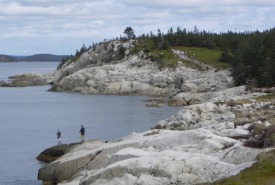Farewell, Dr. Bill

"Dr. Bill Freedman passed away Saturday, September 26, 2015 at his home in Halifax at the age of 65. He was a retired ecologist, former Chair of the Department of Biology and professor emeritus at Dalhousie University."
"The author of over 100 refereed scientific papers and publications, he received a Career Achievement Award from the Canadian Council of University Chairs (2007) and a Canadian Environment Award, Gold Medal Level, in the category of Community Awards for Conservation from the Canadian Geographic Society (2006)."
"Dr. Freedman was a 25-year volunteer with the Nature Conservancy of Canada, having served as National Board Chair from 2008 to 2009 and as Atlantic Regional Board Chair for two terms.
The Nature Conservancy of Canada is honouring a long-time volunteer and major contributor to conservation in Atlantic Canada and across the country."
"It has announced the Dr. Bill Freedman Science in Conservation Internship."
 Dr. Bill Freedman Nature Reserve at Prospect High Head, NS (Photo by NCC)
Dr. Bill Freedman Nature Reserve at Prospect High Head, NS (Photo by NCC)"The Dr. Bill Freedman Nature Reserve is located at Prospect High Head, 23 kilometres southwest of Hallifax. It is 10 kilometres east of Peggy’s Cove, a popular tourist spot."
"Prospect High Head is a popular coastal location for hikers, photographers and people who enjoy birdwatching! The Nature Conservancy of Canada has been working here since 2001, protecting 372 acres (151 hectares) for the area's important coastal barrens and coastal forest. The property provides habitat for native species and also migratory birds. The coastline is used by a variety of sea ducks, including eye-catching harlequin ducks, black scoters and long-tailed ducks."
The Nature Conservancy of Canada
A distinguished Canadian scientist has received recognition in the form of having his name memorialized academically and ecologically; just due for a lifetime in academia as a professor of botany, scientific writing, ecological activism, and love of nature expressed in a variety of experiences both personal and professional. In the waning days of 2014, a hale and healthy 64, with no symptoms to warn of impending health disaster, he was diagnosed with inoperable cancer. The cancer that had established itself in his abdominal cavity had metastasized.
Nothing could be done through medical/surgical intervention to save his life, though it could be prolonged through recommended chemotherapy, considered a part of his palliative care. The secondary cancerous tumours did respond to his first round of chemotherapy, as the radiologist and the oncologist looking after Bill explained to him. But the mass of tumours that represented the initial onslaught remained as they were, at diagnosis; formidable and death-delivering. Another round of chemotherapy was attempted, but to no avail.
This jovial man who so loved nature and avian life in particular which led him to exotic global places to expand the list of birds he had seen and noted, was anticipating his retirement from the workforce. He had experimented with signing on to Arctic cruises, acting in the capacity of scientific adviser to the passengers who appreciated explanations for the phenomena they were observing. He thought he might take that challenge on as a regular schedule, on retirement. He enjoyed the social aspect of being with others, and the usefulness of his experience and knowledge in advancing theirs.
And he was also in the process of completing several manuscripts for publication; one of the history and biological diversity of Sable Island, a second a series of personal stories based on his varied experiences. He was able to complete his Sable Island manuscript. And, with the editorial assistance of a few of his many close friends, he completed the collection of short stories. Both would add to his lifetime of published work, quite apart from the 100-some-odd scientific papers he was responsible for publishing in whole or in part.
He and his wife continued to enjoy the company of their many friends. Many of whom brought over dinners for them, leaving his wife, George-Anne Merrill, free to continue looking after her husband whose condition slowly deteriorated. Initially he reacted well physically; no nausea, no pain, no weight loss, no loss of appetite.
But he could no longer play his fiercely competitive games of squash, could no longer go for trips outside Halifax, let alone prolonged nature walks which he so loved. He did manage some brief excursions with his wife, along with some friends. His son who lives in California, came home. His daughter, who lives in Vancouver, gave birth to her parents' first grandchild, a week before her father Bill died. He was cared for throughout the period of his palliative care by his wife. Living in a three-story house with their bedroom on the third floor, a bed was moved for him to the ground floor.
In 1989, he'd had his first Canadian environmental science textbook, Environmental Ecology published. He later wrote Environmental Science: A Canadian Perspective; the sixth edition is soon to be published. He contributed to two encyclopedias; as well as a book on the 50-year history of the Nature Conservancy of Canada (NCC), a charitable organization dedicated to sustaining Canada’s plants and wildlife. And he was himself dedicated to furthering the work of the Nature Conservancy.
That smile seen on his face in the photograph above was a permanent fixture. He found amusement everywhere he looked. He was, however, serious about the preservation of nature's gift to all her creatures, and the need to be aware of our natural surroundings and to respect them, but life for this man was a constant source of amused inspiration. His mind rarely rested without some ideas kicking in that would lead him later to explore where they might lead him.
He was my brother.

Labels: Academia, Ecology, Environment, Human Relations, In Memoriam, Nature, Science

0 Comments:
Post a Comment
<< Home